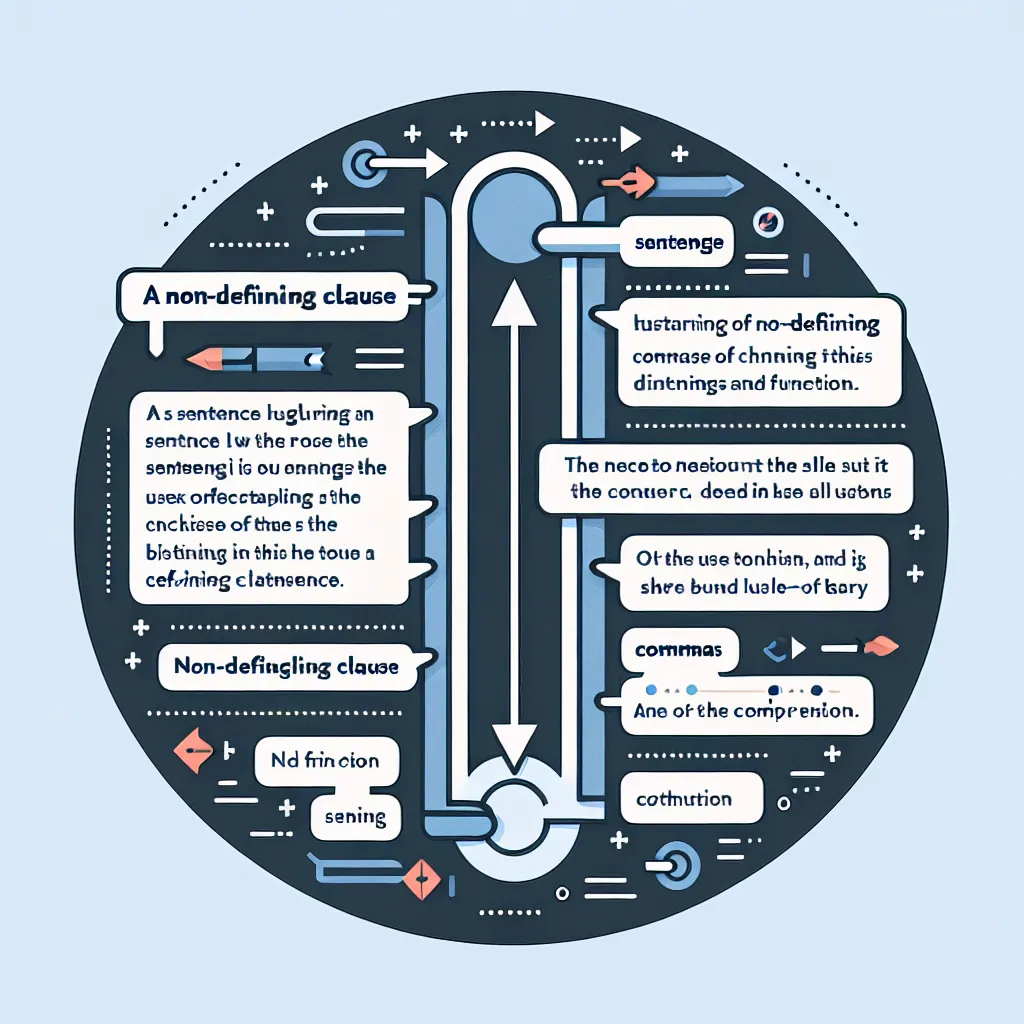Are you looking to elevate your English grammar skills? Mastering Non-defining Clauses is a crucial step towards achieving fluency and precision in your writing and speaking. This guide will walk you through everything you need to know about non-defining clauses, from their basic structure to advanced usage techniques.
What Are Non-Defining Clauses?
Non-defining clauses, also known as non-restrictive clauses, are parts of a sentence that provide additional information about a noun without being essential to the sentence’s core meaning. These clauses are set off by commas and can be removed without changing the fundamental meaning of the sentence.
 Non-defining clause example
Non-defining clause example
Key Characteristics of Non-Defining Clauses
- They are always set off by commas.
- They provide extra, non-essential information.
- They can be removed without changing the sentence’s core meaning.
- They often begin with ‘which’, ‘who’, or ‘whose’.
Why Are Non-Defining Clauses Important?
Mastering non-defining clauses is crucial for several reasons:
- Enhanced Writing Style: They allow you to add detailed information smoothly.
- Improved Clarity: You can provide context without disrupting the main idea.
- Advanced Grammar Proficiency: They demonstrate a higher level of language control.
- IELTS and Academic Writing: They’re particularly useful in formal and academic contexts.
How to Use Non-Defining Clauses Effectively
1. Identify the Right Context
Non-defining clauses are best used when you want to add supplementary information that’s interesting but not crucial. For example:
“My brother, who lives in New York, is visiting next week.”
Here, the clause “who lives in New York” provides extra information about the brother but isn’t necessary to understand the main point of the sentence.
2. Use Proper Punctuation
Always set off non-defining clauses with commas. This is crucial for distinguishing them from defining clauses. For instance:
“The book, which I bought yesterday, is on the table.”
3. Choose the Correct Relative Pronoun
Use ‘who’ for people, ‘which’ for things, and ‘whose’ for possession. For example:
- “Dr. Smith, who is an expert in microbiology, will give a lecture tomorrow.”
- “The old house, which was built in 1920, needs renovation.”
- “My friend, whose car broke down, called me for help.”
4. Practice with Various Sentence Structures
Try incorporating non-defining clauses in different parts of your sentences:
- At the end: “I met Sarah at the conference, who is a brilliant scientist.”
- In the middle: “The new restaurant, which opened last month, has become very popular.”
Common Mistakes to Avoid
- Confusing defining and non-defining clauses
- Forgetting commas
- Using ‘that’ instead of ‘which’ in non-defining clauses
- Placing essential information in a non-defining clause
Advanced Usage of Non-Defining Clauses
As you become more comfortable with basic non-defining clauses, you can explore more advanced applications:
1. Multiple Non-Defining Clauses
You can use multiple non-defining clauses in a single sentence for added complexity:
“My professor, who has published numerous papers, and whose research is internationally recognized, will be speaking at the conference.”
2. Non-Defining Clauses with Participles
For variety, you can use present or past participles instead of relative pronouns:
“The old castle, standing on the hilltop for centuries, attracts thousands of tourists each year.”
3. Comment Clauses
These are a special type of non-defining clause that comment on the whole sentence:
“The project was completed on time, which was a relief to everyone.”
 Advanced non-defining clauses
Advanced non-defining clauses
Practical Exercises for Mastering Non-Defining Clauses
To truly master non-defining clauses, regular practice is key. Here are some exercises you can try:
- Sentence Combining: Take two simple sentences and combine them using a non-defining clause.
- Identifying Clauses: In a given text, identify and underline all non-defining clauses.
- Rewriting Exercise: Rewrite paragraphs, adding non-defining clauses to provide additional information.
- Error Correction: Find and correct mistakes in sentences with incorrectly used non-defining clauses.
For more advanced practice on relative clauses, including non-defining ones, check out our guide on using advanced relative clauses.
Integrating Non-Defining Clauses in Various Writing Contexts
Understanding how to use non-defining clauses in different writing scenarios can significantly enhance your overall English proficiency:
- Academic Writing: Non-defining clauses are excellent for providing additional context or explanations in research papers or essays.
- Professional Writing: They can add a layer of sophistication to business reports or formal emails.
- Creative Writing: In storytelling, these clauses can provide vivid details about characters or settings without interrupting the narrative flow.
For more insights on using advanced grammar structures in professional contexts, visit our article on how to use advanced relative clauses in professional writing.
The Role of Reading in Mastering Non-Defining Clauses
Reading extensively is one of the most effective ways to internalize the correct usage of non-defining clauses. By exposing yourself to well-written texts, you’ll naturally absorb the patterns and contexts in which these clauses are used.
To learn more about how reading can improve your grammar skills, including the use of non-defining clauses, read our article on how to learn grammar through reading.
Conclusion
Mastering non-defining clauses is a valuable skill that can significantly enhance your English writing and speaking abilities. By understanding their structure, practicing their usage, and applying them in various contexts, you’ll be able to express yourself more clearly and elegantly. Remember, like any aspect of language learning, mastery comes with consistent practice and application. Keep experimenting with these clauses in your daily communication, and you’ll soon find them becoming a natural part of your English expression.
We encourage you to share your experiences or questions about using non-defining clauses in the comments section below. Your insights could be invaluable to fellow learners on their journey to English proficiency!




